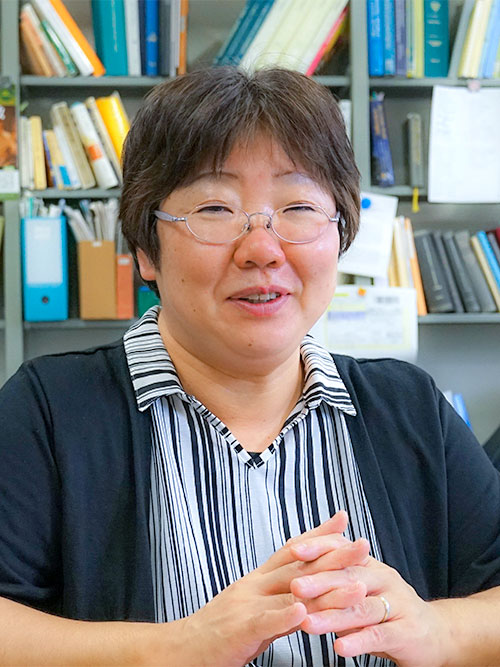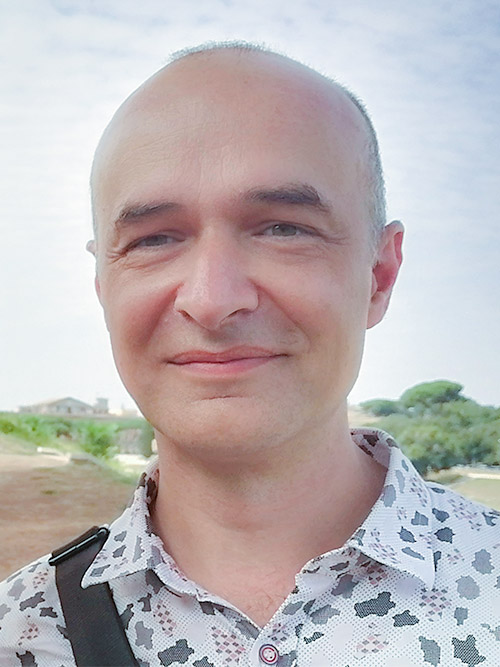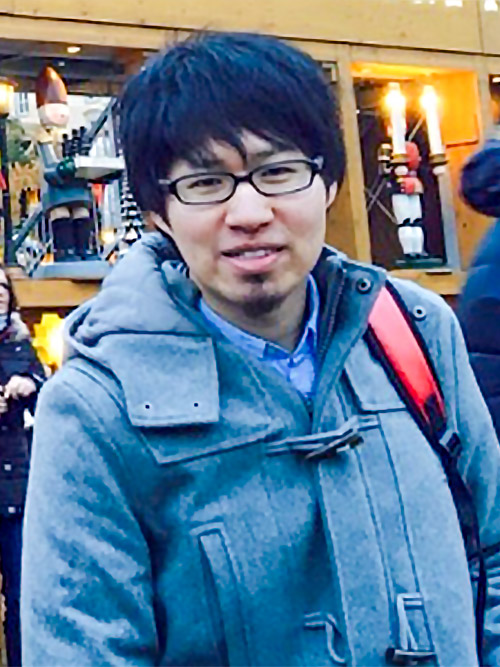Kyoko Amano

Affiliation:
Kyoto University, Graduate School of Letters, Indological Studies, Associate Professor
Joint Appointment: Kyoto University, Graduate School of Letters, Center for Studies of Cultural Heritage and Inter Humanities, Innovation Hub for Inter Humanities.
Career:
Obtained her MA (Indian Philosophy) in the Graduate School of Letters, Osaka University in 1996. Obtained her Dr.phil. in Indo-European Historical Linguistics at Freiburg University in 2001. After working as an assistant in the Graduate School of Letters, Osaka University, she took time to raise a family, then worked as a Restart Postdoctoral fellow (RPD) of Japan Society for the Promotion of Science in the Institute for Research in Humanities, Kyoto University, an invited researcher in the Graduate School of Letters, Osaka University, and an adjunct lecturer in the Graduate School of Letters, Kyoto University, and from 2017 till 2022 an Associate Professor of Hakubi Center / Institute for Research in Humanities, Kyoto University, and from 2022 till 2024 an Interorganizational Joint Researcher in the Graduate School of Letters, Kyoto University. In April 2024 she assumed her current position.
Research
She researches one of the Vedas—the Maitrāyaṇī Samhitā. She has explored and written about the language, particularly related to syntax, occurring in this text. In 2009, she published a partial German translation of this text with linguistic annotations, but aims to complete the unfinished portions of this translation as well as publish a revised edition utilizing newly-discovered manuscripts. She began her exploration of the linguistic layers inside the Maitrāyaṇī Samhitā from 2012, and continues her research into explicating the formative process of that text. She focuses on societal groups with cross-cultural elements at the time, and believes that they were particularly important for the societal conditions during that period to serve as the background to the composition of the text.
Publications:
- Maitrāyaṇī Samhitā I-II. Übersetzung der Prosapartien mit Kommentar zur Lexik und Syntax der älteren vedischen Prosa. Münchner Forschungen zur historischen Sprachwissenschaft Bd. 9. Hempen Verlag. Bremen (2009).
- "What is ‘knowledge' justifying a ritual action? Uses of yá evám véda / yá evám vidvan in the Maitrāyaṇī Samhitā." In: Aux sources des liturgies indo-iraniennes, ed. by Redard, C. / Ferrer-Losilla, J. / Moein, H. / Swennen, P., Collection Religions, Comparatisme - Histoire - Anthropologie 10, 39-68. 2019. Liège: Presses Universitaeire de Liège. (PDF 2.6MB)
- "The Development of the Uses of ha / ha vái / ha sma vái with or without the Narrative Perfect and Language Layers in the Old Yajurveda-Samhitā Texts." Lingua Posnaniensis 61, ed. by Chandotti, M. P. / Pontillo. 2019. T. Sciendo: Warszawa. 11-24. (PDF 716KB)
- “A Non-Śrauta Ritual in the Oldest Yajurveda Text. Maitrāyaṇī Samhitā IV 2 (Gonāmika Chapter). In Proceedings of the 17th World Sanskrit Conference, Vancouver, Canada, July 9-13, 2018, Section 1: Veda, ed. bh Bahulkar, Sh., Jurewicz, J., (2019), 1-27. Published by the Department of Asian Studies, University of British Columbia, on behalf of the International Association for Sanskrit Studies. DOI: 10.14288/1.0379840. URI: http://hdl.handle.net/2429/70986. UBC cIRcle Online Digital Repository (https://circle.ubc.ca).
- “Indication of Divergent Ritual Opinions in the Maitrāyaṇī Samhitā”. Houben, Jan E. M., Rotaru, Julieta, and Witzel, Michael, Vedic Śākhās: Past, Present, Future. Proceedings of the Fifth International Vedic Workshop, Bucharest 2011, (2016), 461-490.
- “Ritual Contexts of Sattra Myths in the Maitrāyaṇī Samhitā”. Pontillo, Tiziana, Dore, Moreno and Hock, Hans Heinrich, Vrātya culture in Vedic sources. Select Papers from the Panel on “Vrātya culture in Vedic Sources” at the 16th World Sanskrit Conference (28 June – 2 July 2015) Bangkok, Bangkok, (2016), 35-72.
- “Zur Klärung der Sprachschichten in der Maitrāyaṇī Samhitā”, Journal of Indological Studies vols.26/27, 2014-2015, 1-36.
- “Style and Language of the Agniciti Chapter in the Maitrāyaṇī Samhitā (III 1-5)”, Journal of Indian and Buddhist Studies. Vol. 63, No. 3, March 2015, 1161-1167.
Contact:
amano.skskrt -at- kcn.jp
Personal Website:
https://researchmap.jp/7000021258
https://orcid.org/0000-0003-1549-6830
Hiroaki Natsukawa

Affiliation:
Osaka Seikei University, Faculty of Data Science, Associate Professor
Career:
Obtained his PhD in the Graduate School of Engineering, Kyoto University in 2013. He worked as a JSPS Research fellow (DC1), as a Program-Specific Assistant Professor at the Graduate School of Engineering, Kyoto University, Program-Specific Assistant Professor at the Academic Center for Computing and Media Studies, Kyoto University (K-CONNEX), then as a Program-Specific Junior Associate Professor / Senior Lecturer. He worked as a guest researcher at the Scripps Institution of Oceanography, UC San Diego. He assumed his current position in April 2022.
Research:
He works on research in visualization & visual analytics to support understanding of big data and multivariate data. He has worked on data-driven visual analytics that integrates dynamic network analysis and information visualization technology in the field of neuroscience, ecology, and biology. He aims to promote data-driven science utilizing data analysis, data transformation, modeling of visual perception, visualization, and visual analytics.
Publications
- Hiroaki Natsukawa, Ethan R. Deyle, Gerald M. Pao, Koji Koyamada, George Sugihara. “A Visual Analytics Approach for Ecosystem Dynamics based on Empirical Dynamic Modeling”, IEEE Transactions on Visualization and Computer Graphics, 27(2), 506-516, (2021)
- Yuki Ueno, Hiroaki Natsukawa, Nozomi Aoyama, Koji Koyamada. “Exploration behavior of group-in-a-box layouts”, Visual Informatics, 3(1), 38-47, (2019)
- Kozen Umezawa, Hiroaki Natsukawa, Yosuke Onoue, Koji Koyamada. “A Visual Analytics System to Support the Formation of a Hypothesis from Calcium Waves Data”, Visual Informatics, 2(1), 2-13, (2018)
- Hiroaki Natsukawa, Koji Koyamada. “Visual analytics of brain effective connectivity using convergent cross mapping”, SIGGRAPH Asia 2017 Symposium on Visualization, SA 2017 (6) 9 pages, (2017)
- Ingo Hilschenz, Yosuke Ito, Hiroaki Natsukawa, Takenori Oida, Tetsuya Yamamoto, Tetsuo Kobayashi. “Remote detected Low-Field MRI using an optically pumped atomic magnetometer combined with a liquid cooled pre-polarization coil”, Journal of Magnetic Resonance, 274, 89-94, (2017)
- Hiroaki Natsukawa, Tetsuo Kobayashi. “Cortical Activation Associated with Determination of Depth Order during Transparent Motion Perception: A Normalized Integrative fMRI−MEG Stud”, Human Brain Mapping, 36(10), 3922-3934, (2015)
Contact:
natsukawa -at- g.osaka-seikei.ac.jp
Personal Website:
https://researchmap.jp/natsuhiro/
https://univ.osaka-seikei.jp/department/data_science/teacher/213
Oliver Hellwig

Affiliation:
University of Zurich, Institut für Vergleichende Sprachwissenschaft
Career:
Oliver Hellwig studied Classical Indology, Religious Studies and Chinese in Berlin and Heidelberg. After graduation he worked at the FU Berlin, where he also completed his PhD (character recognition of Devanagari) and his habilitation on the history of Indian alchemy, at the Cluster of Excellence “Asia and Europe in a Global Context” (Heidelberg) and at the HHU Düsseldorf (SFB 991, “The Structure of Representations in Language, Cognition, and Science”).
He has built the Digital Corpus of Sanskrit (http://www.sanskrit-linguistics.org/dcs/index.php?contents=texte) which is under active development, and he was responsible for designing and implementing the frameworks of IndoSkript (http://www.indoskript.org) and of the projects “Documents on the History of Religion and Law of Pre-modern Nepal” (https://www.hadw-bw.de/forschung/forschungsstelle/religions-und-rechtsgeschichtliche-quellen-des-vormodernen-nepal) and “Online Edition of the Paippalāda Recension of the Atharvaveda” at the University of Zurich (https://www.atharvavedapaippalada.uzh.ch/en.html).
He is currently leading a “ChronBMM — Bayesian Mixture Models für die Datierung von Textkorpora” in Digital Humanities Project by Federal Ministry of Education and Research:
https://chronbmm.phil.hhu.de/
https://www.geistes-und-sozialwissenschaften-bmbf.de/de/Digital-Humanities-1710.html
Articles:
Hellwig, Oliver, Salvatore Scarlata und Paul Widmer (to appear in JAOS). “Assessing Rigvedic Strata”. In: Eingereicht bei JAOS.
Hellwig, Oliver (2019). “Dating Sanskrit Texts Using Linguistic Features and Neural Networks”. In: Indogermanische Forschungen 124, S. 1–47.
Hellwig, Oliver (2010a). “Etymological Trends in the Sanskrit Vocabulary”. In: Literary and Linguistic Computing 25.1, S. 105–118.
– (2009). “A Chronometric Approach to Indian alchemical literature”. In: Literary and Linguistic Computing 24, S. 373–383.
– (2008). “Frequent phrases and their Application to Text Segmentation”. In: Studien zur Indologie und Iranistik 25, S. 55–72.
– (2003). “Automatisierte Suche von Wortgruppen in Sanskrit-Texten”. In: Berliner Indologische Studien 15/16/17, S. 251–263.
Conference Proceedings:
Hellwig, Oliver (2020). “Dating and Stratifying a Historical Corpus with a Bayesian Mixture Model”. In: Proceedings of the LT4HALA. Hrsg. von Rachele Sprugnoli und Marco Passarotti, S. 1–9.
Hellwig, Oliver, Salvatore Scarlata, Elia Ackermann und Paul Widmer (2020). “The Treebank of Vedic Sanskrit”. In: Proceedings of the LREC. Hrsg. von Nicoletta Calzolari, Frédéric Béchet, Philippe Blache, Khalid Choukri, Christopher Cieri, Thierry Declerck, Sara Goggi, Hitoshi Isahara, Bente Maegaard, Joseph Mariani, Hélène Mazo, Asuncion Moreno, Jan Odijk und Stelios Piperidis, S. 5139–5148.
Hellwig, Oliver und Sebastian Nehrdich (2018). “Sanskrit Word Segmentation Using Character-level Recurrent and Convolutional Neural Networks”. In: Proceedings of the 2018 Conference on Empirical Methods in Natural Language Processing. Brussels: Association for Computational Linguistics, S. 2754–2763.
Hellwig, Oliver (2015). “Morphological Disambiguation of Classical Sanskrit”. In: Systems and Frameworks for Computational Morphology. Hrsg. von Cerstin Mahlow und Michael Piotrowski. Cham: Springer, S. 41–59.
Hellwig, Oliver und Sven Sellmer (2015). “Frame Semantic Annotation of Sanskrit Texts”. In: Proceedings of the SALA-31, S. 30–33.
Hellwig, Oliver (2013). “Googling the Rishi. Graph Based Analysis of Parallel Passages in Sanskrit Literature”. In: Recent Researches in Sanskrit Computational Linguistics. Hrsg. von Malhar Kulkarni und Chaitali Dangarikar. D. K. Printworld, S. 172–190.
– (2012). “Computational Processing of Sanskrit – Challenges and Perspectives”. In: 14th World Sanskrit Conference, Proceedings of the Linguistic Section. Hrsg. von Jared S. Klein und Kazuhiko Yoshida. Bremen: Hempen Verlag, S. 37–48.
Click here for more information!
Contact:
hellwig7 -at- gmx.de
Personal Website:
https://uzh.academia.edu/OliverHellwig
Yuki Kyogoku

Affiliation:
Doctoral candidate of Indology, Institute for South and Central Asian Studies, Leipzig University
Research Associate in the project "Divergent Discourses" at Leipzig University.
Career:
After obtained his MA at Graduate School of Humanities and Human Sciences, Hokkaido University in 2013, he worked as a system engineer at Accenture PLC. In 2016, he studied in the Institute of Indology and Central Asian Studies, Leipzig University. He is currently enrolled in a PhD program. Beginning in October 2018, he also worked as a research assistant in Institute of Computer Science, Leipzig University, and since July 2022 at Institute for Applied Informatics. Since May 2024, he is working for the project "Divergent Discourses: Processes of Narrative Construction in Tibet, 1955-62" ( https://research.uni-leipzig.de/diverge/ ) at the Institute for South and Central Asian Studies, Leipzig University.
Research:
He specializes in the two differing fields of Buddhist studies and Information Science. In Buddhist studies, he researches epistemology and philosophy of language centered on the works of Dharmakīrti, a Buddhist philosopher of the 7th century. For his doctoral dissertation, he is currently working on creating a critical edition of a Sanskrit text known as the Pramāṇavārttika. In the field of Information Science, he works in the field of natural language processing that uses computers to process natural language. He specifically analyzes the information content of words and sentences using Claude Shannon’s information theory, and applies this to automatic summarization and keyword extraction in the German language. He also engages in the comparative research of distribution of information content in German, Tagalog and the Indonesian language.
Publications:
- Erhard, F. Xaver & Kyogoku, Yuki. (2024). Modern-Botok. Custom dictionary for modern Tibetan (v0.1) [Data set]. Zenodo.
https://doi.org/10.5281/zenodo.14034747 - Michael Richter, Maria Farre, Max Kölbl, Yuki Kyogoku (2022), "Uniform Density in Linguistic Information derived from Dependency Structures," Conference: ICAART 2022 Special Session NLPinAIVolume: Vol.1: 496 - 503. DOI:10.5220/0000155600003116.
- Max Kölbl, Yuki Kyogoku, J. Nathanael Philipp, Michael Richter, Clements Rietdorf, Tariq Yousef (2022), "Beyond the Failure of Direct-Matching in Keyword Evaluation: A Sketch of a Graph Based Solution," Frontiers in Artificial Intelligence, Sec. Language and Computation Vol. 5. https://doi.org/10.3389/frai.2022.801564
- J. Nathanael Philipp, Max Kölbl, Yuki Kyogoku, Tariq Yousef (2022), "One Step Beyond: Keyword Extraction in German Utilising Surprisal from Topic Contexts," Intelligent Computing, 774 - 786. DOI:10.1007/978-3-031-10464-0_53
- Max Kölbl, Yuki Kyogoku, J. Nathanael Philipp, Michael Richter, Clemens Rietdorf, and Tariq Yousef (2021), “The Semantic Level of Shannon Information: Are Highly Informative Words Good Keywords? A Study on German.” (to appear in the Springer series Studies in Computational Intelligence (SCI)).
- Max Kölbl, Yuki Kyogoku, J. Nathanael Philipp, Michael Richter, Clemens Rietdorf and Tariq Yousef (2020), “Keyword Extraction in German: Information-theory vs. Deep Learning,” Proceedings of the 12th International Conference on Agents and Artificial Intelligence, ICAART 2020, Volume 1, Valletta, Malta, February 22-24, 2020, Volume 1, 459-464.
- Michael Richter, Yuki Kyogoku and Max Kölbl (2019), “Estimation of Average Information Content: Comparison of impact of contexts,” Intelligent Systems and Applications – Proceedings of the 2019 Intelligent Systems Conference, IntelliSys 2019, London, UK, September 5-6, 2019, Volume 2, Springer. 1251-1257.
- Michael Richter, Yuki Kyogoku and Max Kölbl (2019), “Interaction of Information Content and Frequency as Predictors of Verbs’ Lengths,” Business Information Systems – 22nd International Conference, BIS 2019, Seville, Spain, June 26-28, 2019 Proceedings, Part I, Springer. 271-282.
Contact:
kyogoku11 -at- gmail.com
So Miyagawa

Affiliation:
University of Tsukuba, Institute of Humanities and Social Sciences, Associate Professor
Joint Appointment: Research Center for West Asian Civilization (https://rcwac.histanth.tsukuba.ac.jp/)
Career:
After his Master and Doctoral study at Graduate School of Letters, Kyoto University, he pursued further specialization in Egyptology and Coptic Studies at the University of Göttingen. In March 2022, he received the degree of Doctor of Philosophy (Dr. phil.) from the University of Göttingen. From October 2015 to March 2020, he worked as a researcher
at the Collaborative Research Center 1136 "Education and Religion in Cultures of the Mediterranean and its Environment from Ancient to Medieval Times and to the Classical Islam" (http://www.sfb1136.uni-goettingen.de/), funded by Deutsche Forschungsgemeinschaft (DFG) and based at the University of Göttingen. In 2020, he held the position of Postdoctoral Fellow (PD) at the Kansai University Open Research Center for Asian Studies (KU-ORCAS). In 2021, he worked as an Assistant Professor at the Center for Studies of Cultural Heritage and Inter Humanities, Graduate School of Letters, Kyoto University. Since 2022 till March 2024, he worked as Assistant Professor in National Institute for Japanease Language and Linguistics, Research Department, since April 2024 he has been in his current position.
Research:
He utilizes world standards in digital humanities, such as TEI (Text Encoding Initiative) and IIIF (International Image Interoperability Framework), for the digitalization of cultural heritage and language resources, including literature and linguistic materials. His research field encompasses linguistics (primarily Japanese, Ryukyu languages, Egyptian historical linguistics with a focus on Coptic, Old Nubian and Greek of the New Testament), digital humanities using methods from natural language processing and corpus linguistics. He has a particular interest in phonology, graphemics, typology of languages, language change, and the digitalization of religious and literary texts in Asia and Africa. His research also includes philological studies, focusing on Japanese and Okinawan Bible translations, Coptic and Old Nubian Bible translations, the Greek original of the New Testament, the Septuagint (Greek translation of the Hebrew Bible), pre-Coptic Ancient Egyptian texts, and the phonology, grammar, and language contact of these languages.
Publications:
- So Miyagawa, Kanji Kato, Miho Zlazli, Salvatore Carlino, Seira Machida (2023), "Building Okinawan Lexicon Resource for Language Reclamation/Revitalization and Natural Language Processing Tasks such as Universal Dependencies Treebanking," Nikolai Ilinykh, Felix Morger, Dana Dannélls, Simon Dobnik, Beáta Megyesi, Joakim Nivre (eds.), Proceedings of the Second Workshop on Resources and Representations for Under-Resourced Languages and Domains (RESOURCEFUL-2023), Stroudsburg, PA: Association for Computational Linguistics (ACL), 86 - 91.
- Miyagawa, So, (2022)“Digital History of Egypt in the Roman and Byzantine Periods: A Case Study of Shenoute the Archimandrite,”Historical Studies of the Western World 1, 26-33.
- Miyagawa, So, (2021) “Digitization of Coptic Manuscripts and Digital Humanities: Tools and Methods for Coptic Studies,”The International Journal of Levant Studies 2, 29-61.
- Nakano, Tozen (orig.), Toyomi Hirai, James P. Wills, Yuki Kyogoku, So Miyagawa, (trans.) (2019) TEXTBOOK: Thanatology of Buddhism: Meta-Cognition,Grief Care Resilience. Fueisha.
- Caroline T. Schroeder, Ulrich Schmid, So Miyagawa, Elizabeth Platte, Amir Zeldes, (2019) KELLIA White Paper on Transcription and Encoding Standards for Digital Coptic. National Endowment for the Humanities.vv
- Miyagawa, So, Kirill Bulert, Marco Büchler, Heike Behlmer, (2019) “Optical character recognition of typeset Coptic text with neural networks,”Digital Scholarship in the Humanities 34 (Suppl. 1), i135-i141.
Contact:
miyagawa.so.kb -at- u.tsukuba.ac.jp
Personal Website:
https://researchmap.jp/SoMiyagawa
https://somiyagawa.com/
https://somiyagawa.de/
https://orcid.org/0000-0002-2950-7193
Yuzuki Tsukagoshi

Affiliation:
Assistant Professor, Digital Humanities Initiative, Center for Evolving Humanities, Graduate School of Humanities and Sociology, The University of Tokyo
Career:
He obtained his Ph.D. from the Graduate School of Humanities and Sociology at the University of Tokyo in March 2023. He held the position of Research Fellow (DC1) at the Japan Society for the Promotion of Science (JSPS) from April 2020 to March 2023. Since April 2023, he has been in his current role. He is currently working for the project funded by Grant-in-Aid for Research Activity Start-up, "Creating Structured Data for Vedic Texts and Unraveling Linguistic Relationships Between Texts" (August 2023 - March 2026).
https://kaken.nii.ac.jp/grant/KAKENHI-PROJECT-23K18646
Research:
His primary focus lies in the Rigveda, the oldest Sanskrit literature. His research centers around exploring the linguistic perspectives on the relationship between composers of the Rigveda. He actively employs natural language processing techniques to study Vedic literature and organize texts, aiming to enhance the comprehensiveness and verifiability of Vedic literature research.
By annotating linguistic information to words in the texts, he seeks to shed light on the correlations between authors and their use of language. Moreover, through the application of information representation and machine learning methods, he aims to achieve objective validation of advancements in Vedic studies and broaden the understanding of Vedic literature with fresh insights.
Publications:
- Ikki Ohmukai, Yuzuki Tsukagoshi (2024), "N-gram-Based Preprocessing for Sandhi Reversion in Vedic Sanskrit", Proceedings of the 4th International Conference on Natural Language Processing for Digital Humanities, 275-279.
- Yuzuki Tsukagoshi, Ikki Ohmukai (2024), "The Metronome Approach to Sanskrit Meter: Analysis for the Rigveda", Proceedings of the 1st Workshop on Machine Learning for Ancient Languages (ML4AL 2024), 219-223.
- Yuzuki Tsukagoshi (2021), "POS tagging for Vedic Sanskrit using deep learning", Proceedings of JADH conference 2021, 69-71.
Contact:
yuzuki@l.u-tokyo.ac.jp
Personal Website:
https://researchmap.jp/yuzukitsukagoshi?lang=en
